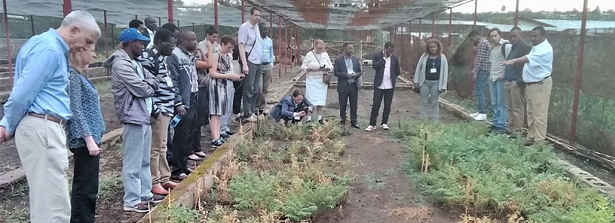17 May 2019. Addis Ababa, Ethiopia. Key international and regional agrofood sector actors and investors were brought together for a workshop to explore seed systems challenges as well as opportunities for further collaboration.
This international multi-stakeholder workshop on Seed Systems Development was held at ILRI Addis Ababa campus. It was organized by CGIAR, the government of the Netherlands, USAID, ISSD Africa, NWO-WOTRO, the Food & Business Knowledge Platform and AgriProFocus, subsequent to the CGIAR systems council meeting and an internal meeting on Seed Systems Development with the nine research teams.
Around 90 Ethiopian and international experts discussed how to jointly tackle major bottlenecks in the functioning of seed systems. Representatives of nine recently started “Seed Systems Development” research projects of the Netherlands-CGIAR partnership also took part.
This workshop report, published on 28 June 2019 and also linking to full minutes of the meeting, covers the main proceedings and can be found here.
- The participants considered that collaboration in public and private partnerships is key for progress in the seed system.
- Various institutions, companies and networks make their contribution to strengthening seed systems in Africa, Asia and other continents.
- CGIAR, for instance, is modernizing its portfolio of Research Programmes (CRPs) to make sure these deliver the right variety to the farmers; and it works in collaborative structures within CGIAR to address key systemic bottlenecks.
Still, a gap remains in the flow from innovation to delivery. This is why CGIAR appreciates the recently started NL-CGIAR research projects, as they address exactly this gap. Further initiatives and partnerships by the private sector, such as the Syngenta Foundation, also play an important role as they can partner with seed entrepreneurs, and help introduce new varieties in countries and encourage other companies to invest. However, for some – often subsistence – crops it is difficult to get the private sector on board. This means a public-private partnership (PPP) approach is often required to make progress for crops that are less commercially viable.
Presentations
Presentations
- “A value chain of innovations: how to tackle the challenges for seed system changes” – presentation by Philippe Ellul (PhD), Senior Officer, Program Performance (CGIAR System Management Office Montpellier)
- “More choice, better access – Seeds2B program” – keynote by Ian Barker (Syngenta Foundation, Head Agricultural Partnerships)
- “Guiding seed sector transformation” – keynote by Mohammed Hassena & Gareth Borman (ISSD Ethiopia)


No comments:
Post a Comment